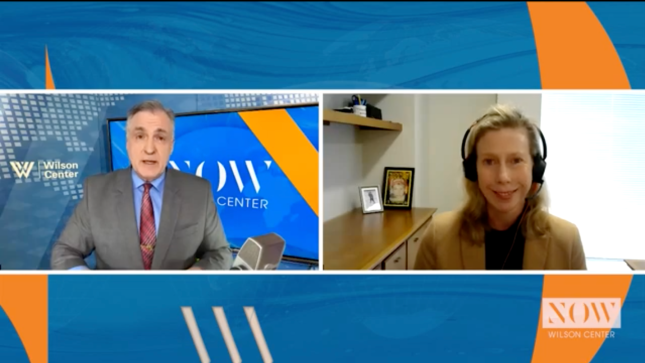-
Gender Equality and Health Equity Through Foreign Policy: A Progress Report
May 3, 2023 By Sophia DeLuca
In this edition of Wilson Center NOW, Gender Equality and Health Equity Through Foreign Policy: A Progress Report, John Milewski, Moderator of the Wilson Center NOW series, interviews Valerie Percival, Wilson Center Fellow and Associate Professor at the Norman Paterson School of International Affairs (NPSIA) at Carleton University and a Commissioner with the Lancet-SIGHT Commission on Peace, Justice, and Gender Equality for Healthy Societies. Percival and Milewski discuss the role of gender equality and health equity in achieving social and political progress, and the importance of these topics in conversations about foreign policy. Percival also explains her project at the Wilson Center, titled “Promoting Gender Equality and Health Equity through Foreign Policy: Panacea or Fool’s Game?”
Selected Quotes:
The importance of investing in gender equality and health equity:
“Foreign policy decision makers have often seen health as an outcome of social processes and political processes, rather than something that can act independently to influence the dynamics of peace and conflicts.”
“Gender equality and health equity can’t be built through rhetoric alone. We need to ensure that we actually invest in the mechanisms to improve health outcomes and to improve gender outcomes.”
“I worry about investments in gender equality and health equity particularly when we see foreign policy arise in a discussion on national security priorities, be them economic security or military security, rights-based discourse like health equity and gender equality often don’t fare well when you have securitized foreign policy discourse.”
“There is such convincing evidence that gender equality is good for societies, it’s good for the economy, it’s good for politics and it’s good for peace. And yet, it’s very challenging to understand the best path forward, how to get there, hopefully some of the research we have done will help nudge forward this conversation.”
On the impact of the health crisis on women and girls:
“I think that women and adolescent girls are disproportionately affected and differently affected. What we saw in the COVID pandemic, in terms of mortality, I think it’s important to emphasize and acknowledge that in many countries in the world, men had a much higher mortality rate in part because of biological factors and in part because of their kinds of occupations. A lot of men continued to work with more risk acceptance…I think where we saw women and girls much more affected was in terms of caregiving and in terms of choices to exit the formal economy.”
“I think if you are only portraying women and girls as victims instead of focusing on their agency and the fact that they are leaders in their communities and that they enable other families in their communities to navigate crises, natural disasters, and conflicts. When we characterize women and girls as victims rather than as agents, as leaders, I think that that has a subtle impact in terms of how you characterize policy; how you frame policy.
“I think it’s important to point out that the health sector itself has very deep gender biases. If you think about who leads the health sector it’s often disproportionality led by men, even though the vast majority of health workers are women around the world.”
Photo credit: Screenshot of interview featuring John Milewski, and Valerie Percival, courtesy of Maternal Health Initiative.
 A Publication of the Stimson Center.
A Publication of the Stimson Center.



